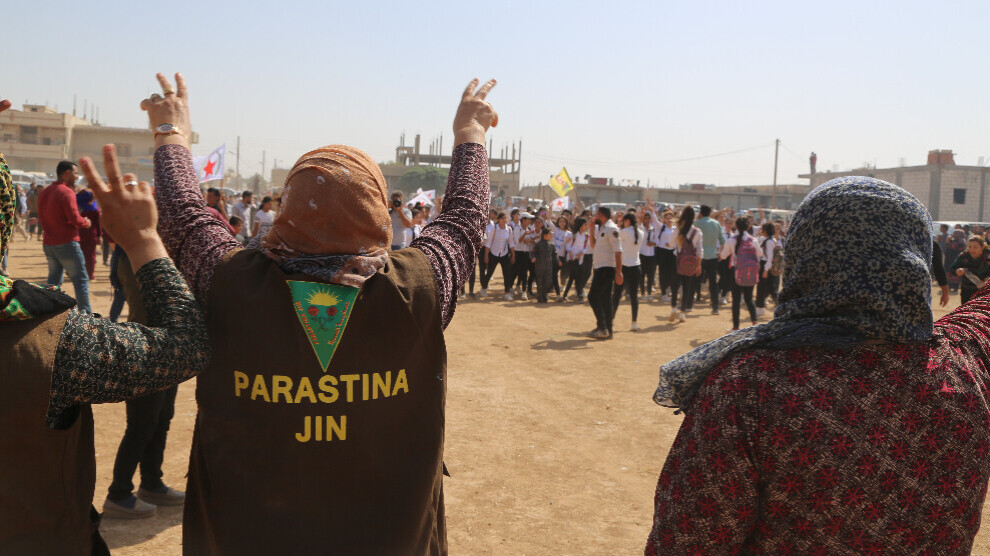Revolutionary People's War against the occupation in Rojava – II
The Social Defence Forces (HPC) continues to fulfil its self-defence duties in line with the dictum "the only duty is the defence of the country and the people".
The Social Defence Forces (HPC) continues to fulfil its self-defence duties in line with the dictum "the only duty is the defence of the country and the people".

The Social Defence Forces (HPC) were formed as the people's self-defence force during the Rojava Revolution.
As it is known, the participation of the people in the defence of Kobanê was limited, and a similar situation occurred in Afrin, Serêkaniyê and Girê Spî later on. The HPC was established in the early years of the revolution and conducted unprofessional activities.
HPC's activities in the early stages were mainly to assist the military forces and to provide the rear-guard support and logistics. Meanwhile, they also participated in the revolutionary campaigns against ISIS. Its members became martyrs or injured. Afterwards, it controlled some security points, rallies, meetings, patrolled in rural areas, and supported Asayish (public order force) in the city. It also carried out activities to ensure the security of institutions to a significant extent.
CURRENT STAGE
Previously, HPC's organization was restricted to local and cantonal levels. It was undertaking activities within the framework of local governments. The organizational perspective was social in nature. The current task of the HPC is to make its structure more organized, to ensure that its organization at the local level is designed with a common perspective focusing on the local government, and to develop its defence capabilities in favour of the country and the people. Also, it seeks broad participation in the conduct of the revolutionary people's war and to encourage people to take part in the revolutionary war.
However, the HPC does not restrict itself and its work to these activities. It tries to organize the civil defence to deal with social disorder and natural disasters. Protection of agricultural areas against wildfires and participation in the fight against possible natural hazards are among its tasks. In short, it aims to take part in matters concerning the defence of the people and the country.
DIFFERENCE FROM MILITARY FORCES
There are also other organizations such as the YPG, YPJ and Asayish. These are also defence-based organizations. The YPG and the YPJ are fully armed military forces. Their main field of activities is professional military service and defence. Asayish is also organized to provide internal security services.
Asayish also has a role in defence. They provide internal security services. In this sense, its capabilities cannot be compared to the YPG and the YPJ. Duties, organizations and capacities of these forces are determined by their internal regulations. While the YPG and the YPJ have a completely professional organization, Asayish has a part-time working principle. In other words, an Asayish member spends half of his/her time working on daily tasks, while spending the rest of his/her time in a civilian manner. When it comes to defence issues, they support the 'army' full time, but this does not change their current situation. The YPG and the YPJ, on the other hand, carry out their own activities on a full-time basis during their duty term. These are the differences.
DEFENSE CANNOT BE LEFT TO OTHERS
The existence of these forces does not make the existence of HPC unnecessary. Each organization has its own tasks. The HPC consists of ordinary people. It does not have a full-time framework and sense of duty, neither professionally, like Asayish, nor institutionally, like the YPG and the YPJ. Patriotism is the basic framework of the HPC. It has the task of fighting enemy forces wherever there is a need. In short, the duties of all the organizations mentioned above, including the HPC, are determined by their programs, regulations and instructions. There are differences between them. No organization is meant to replace another one.
The main principle here is this: The right to defence is sacred, it cannot be postponed, transferred, or left to others. Therefore, it is society's own business to defend itself. Although there are professionally established organizations, society needs organizations or mechanisms to defend itself.
EVERYONE IS A NATURAL MEMBER
There is no such thing as recruiting by the HPC. People of all nationalities and social structures living under the Democratic Autonomous Administration in Rojava/North-East Syria are considered natural members of the HPC. Anyone who is patriotic, does not accept the invasion attacks of the enemy forces and wants to resist it, can become a member of the HPC. Therefore, every member of society is also a member of the HPC. These are the criteria to be a part of it.
The HPC also works like a public institution. It is open, public and has institutions. It also has thousands of active popular members who conduct their work on a daily basis. There are also members in a wider framework, who can be summoned when requested. Every HPC member goes through a training process. These training processes differ based on activities and operations. Active members receive training at academic levels.
HPC WILL ACTIVELY JOIN THE BATTLE
The HPC is actively participating in the preparations for a Revolutionary People's War against the Turkish state. It will act in line with its founding objectives to protect the Rojava Revolution and will fight the occupying forces. It will stand by the YPG-YPJ when needed, fight together with other defence organizations and carry out defence duties where needed. The HPC will join the battle on all fronts. In case of an invasion attack, the most important task for the HPC and its members will be the defence of the country and the people, while all other tasks will remain secondary. The HPC will take its place in the resistance against the invasion attacks of enemy forces and fulfil its self-defence duties.